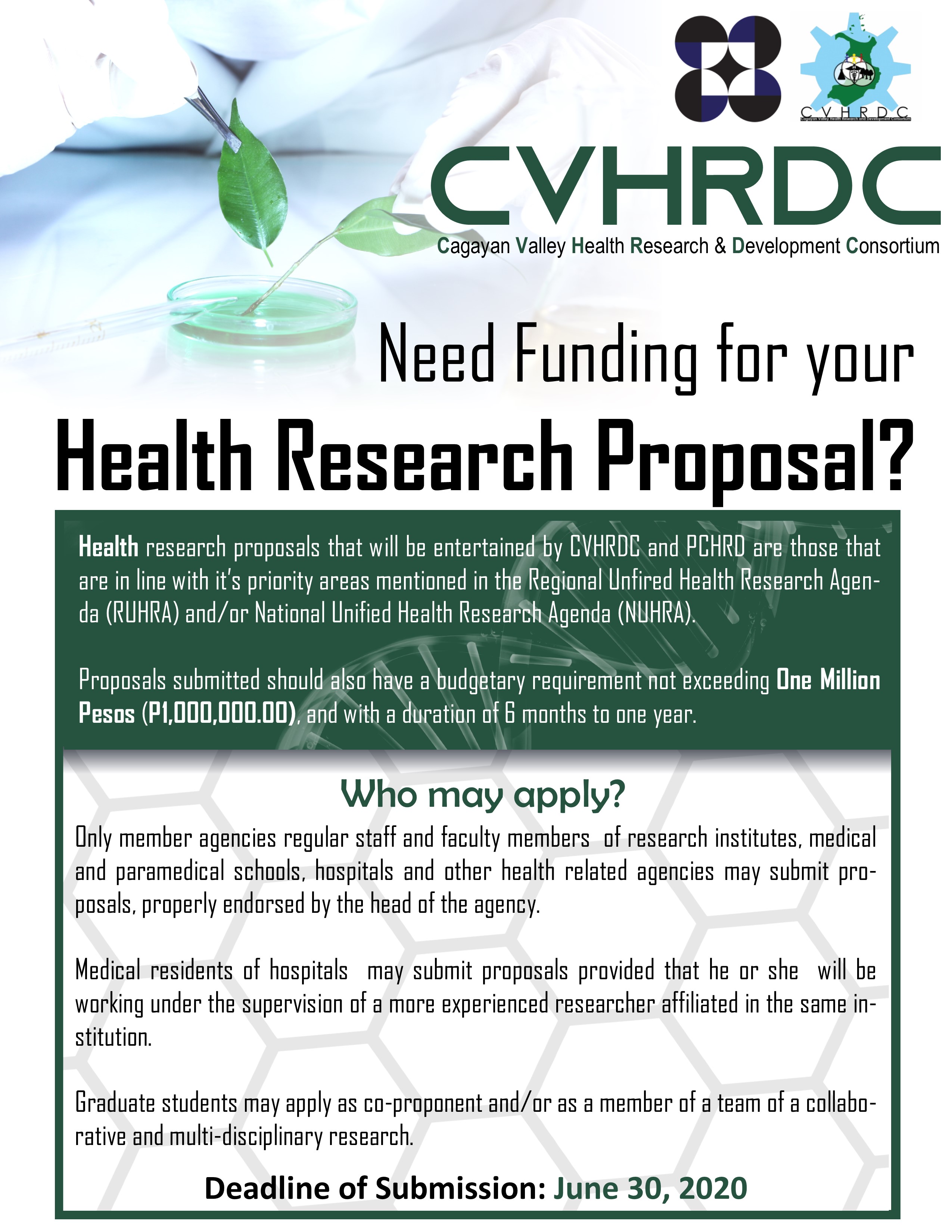1. Why should I submit a research proposal?
Health research contributes to the achievement of our national health goals by providing sustainable health solutions that are world-class, affordable, and accessible for all.
Your research proposal can make change happen.
2. Who can submit a research proposal to PCHRD?
- Filipinos with at least a Master’s Degree in relevant field
- Has proven research competence/track record
- Is employed/affiliated in universities/colleges, research agencies/institutes, hospitals, and other health-related agencies
3. How do I submit a research proposal?
For the Call for Proposals 2021-2022 –
- Register as Researcher at the DOST Project Information Management System: dpmis.dost.gov.ph
- Click submit a new proposal on the proponent dashboard and fill-in the required fields
For more information, watch the tutorial here: https://bit.ly/PCHRDCallforProposals21-22
4. Aside from a research proposal, what are other documents required when applying for a research grant to PCHRD?
- Workplan Schedule (Gantt chart of activities)
- Appropriate clearance needed (Ethics clearance; Biosafety clearance; Animal care and use clearance)
- Informed consent form (for research involving human participants)
- Case report form, if applicable
- Endorsement of agency head
- Duties and responsibilities of each project personnel
- Letter of request addressed to PCHRD Executive Director
5. What is the evaluation process for research proposals?
- In-house screening in terms of alignment to the research priorities, duplication, and completeness of requirements
- Technical review by external consultants
- Approval by the PCHRD Governing Council or the PCHRD Executive Director depending on the recommended total budgetary requirement of the proposal. If funding will be sourced from the DOST-Grants in Aid, the DOST Executive Committee will be the final approving body.
6. What are the PCHRD research priority areas?
For this year’s call for proposals, the DOST-PCHRD accepts proposals on the following program areas:
- Diagnostics
- Functional foods, Nutrition, Food Safety
- Biomedical Engineering & Health Technologies
- Information and Communication Technology for health
- Dengue and Other Arboviruses
- Disaster Risk Reduction and Climate Change Adaptation
- Mental Health
- OMIC technologies for health (Platform technology across research priorities)
For more information on the specific priority research topics, please download the handout of the Call for proposals 2021-2022 here: https://bit.ly/PCHRDPriorities21-22
7. Who should I contact for concerns regarding research grants? (Sino ang pwedeng kontakin para sa mga katanungan patungkol sa research grants?)
Following are the contact persons for each of the program area:
- OMIC Technologies for Health: Mr. Jose Joy Gepanaga - This email address is being protected from spambots. You need JavaScript enabled to view it.
- Information & Communication Technology for Health: Ms. Pearl Kathleen Tumlos - This email address is being protected from spambots. You need JavaScript enabled to view it.
- Biomedical Engineering and Technologies for Health: Mr. Jose Joy Gepanaga - This email address is being protected from spambots. You need JavaScript enabled to view it.
- Disaster Risk Reduction & Climate Change Adaptation: Mr. Rogelio Guaring - This email address is being protected from spambots. You need JavaScript enabled to view it.
- Dengue and Other Arboviruses: Ms. Guiddita Gelera - This email address is being protected from spambots. You need JavaScript enabled to view it.
- Functional Foods: Ms. Marianne Joy Gochangco-Laya - This email address is being protected from spambots. You need JavaScript enabled to view it.
- Diagnostics: Ms. Mary Ann Pacho - This email address is being protected from spambots. You need JavaScript enabled to view it.
- Mental Health: Ms. Marianne Joy Gochangco-Laya - This email address is being protected from spambots. You need JavaScript enabled to view it.
8. Is there a deadline for this year’s submission of proposals?
You may submit your research proposals from April 1 to April 30, 2020.
9. How long will the review process take?
The review process will take 40 working days provided that all the requirements were submitted
For more information, go to: https://bit.ly/CallConferenceMaterials
source: http://pchrd.dost.gov.ph/index.php/news/6531-faqs-dost-pchrd-call-for-proposals-2021-2022






